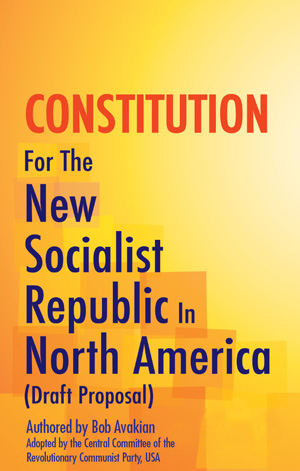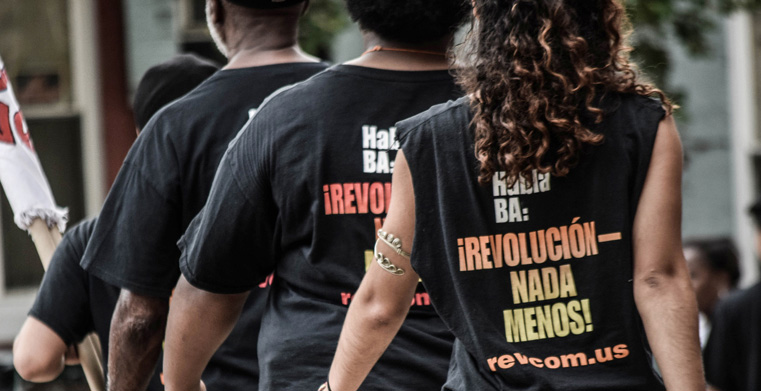From a member of the Revolution Club, Bay Area
Revolution Club Digs into the New Socialist Republic and the Environment, Economy, International Relations, and Education
| Revolution Newspaper | revcom.us
Last weekend at our Revolution Club meeting we read and discussed some excerpts from the Constitution for the New Socialist Republic in North America that talk about the environment and related topics. One of the Revolution Club members has been emphasizing the importance of envisioning the world we’re fighting for, and not having our thinking be so trapped in the way the world is now. And we’ve all been thinking a lot about the environment, since we spent so much time this past month literally choking on the smoke from fires fueled by global warming, while first the UN and then the U.S. government came out with dire reports about how little time we have to radically change everything in order to stop a climate catastrophe. Plus, after the revolution, we’re the ones who are gonna have to implement this Constitution and solve all these pressing problems while keeping things going forward toward a liberated communist world. And right now, at a time when more and more people are starting to identify “capitalism” (however they understand that) as the problem but can’t imagine anything beyond that, bringing people the understanding that there IS a radical solution to this environmental emergency is a key avenue for putting real revolution on the map. So this was a very important subject for us to dig into!
We had a really interesting discussion. After we read the part where it talks about how the New Socialist Republic will not develop or use nuclear weapons (Article I, Section 2, C. Defense and Security), which people really liked, someone raised the question of how you defend yourself from other countries which will still have nuclear weapons. Other people talked about how using nuclear weapons would turn us into what we’re fighting against, and the positive example of leadership that is set for the world by dismantling them, but how this problem can only really be dealt with by spreading revolution throughout the world.
We talked about what a consciously planned economy is, as opposed to worker-owned co-ops which someone had raised, and the need to move beyond a system where things are bought and sold as commodities. We discussed the three criteria of economic development (Article IV, Section 1), and the tension between them, and from what perspective these things would have to be weighed and balanced as you make decisions about what to produce, how to produce it, and where to allocate resources.
We explored some of the contradictions involved in international relations (Article I, Section 2, E. International Relations), becoming self-reliant while still having trade relations, but as much as possible not relying on long-distance shipping (for environmental reasons), and not relying on the super-exploitation of people throughout the world. We had a whole discussion about how we would go about repairing the damage that was done to these Third World countries, environmentally and in terms of the poverty, etc. People raised the question of what you would do with all the U.S. capital around the world, the factories and plantations, etc., and if there was something else that could be done besides just turning it over to the ruling classes of those countries. People brought up different ideas, like maybe we can send teams to other countries to build housing, etc., and what would happen if the oppressive governments tried to stop you from doing that, and how that too could hasten revolution in those countries.
Someone correctly raised the need to not just transform the economy, but also the culture. For example, she talked about a documentary she’d seen about the exploitation and environmental damage caused by the fashion industry and why, in addition to the socialist state taking over the means of production, we also have to change people’s felt need to have a Prada bag or whatever. We also talked about the principle of communism—from each according to their ability, to each according to their need—and all the changes in economics, social relations, and ideas that would be required to get there.
We talked about what it says in the Education section (Article I, Section 2, F. Education) about pursuing the truth, using rational and critical thinking, and teaching the scientific method (and teaching the truth of things that are true like evolution and global warming)... which people really liked, in comparison to the current school system, and especially in contrast with the proud ignorance of the people running the U.S. government now. One person said it sounded like the Enlightenment, and so we talked about Bob Avakian’s point, as discussed in "Marxism and the Enlightenment," about the Enlightenment dividing in two. We talked about the “solid core and elasticity” in this, in terms of core curriculum and the elasticity of whatever people do outside out that, and what difference it would make for this to be the core, not just in terms of education, but the whole character of society and how the new generation is being raised.
All of this is very much related to these two Q&A clips from Bob Avakian, which just got posted on revcom.us: “What Would Society Look Like Right After the Revolution?” and “ Would Mexico and Central America Still Be the U.S. Backyard After the Revolution?”
CONSTITUTION For The New Socialist Republic In North America
(Draft Proposal)
Authored by Bob Avakian, and adopted by the Central Committee of the RCP
Get a free email subscription to revcom.us:



